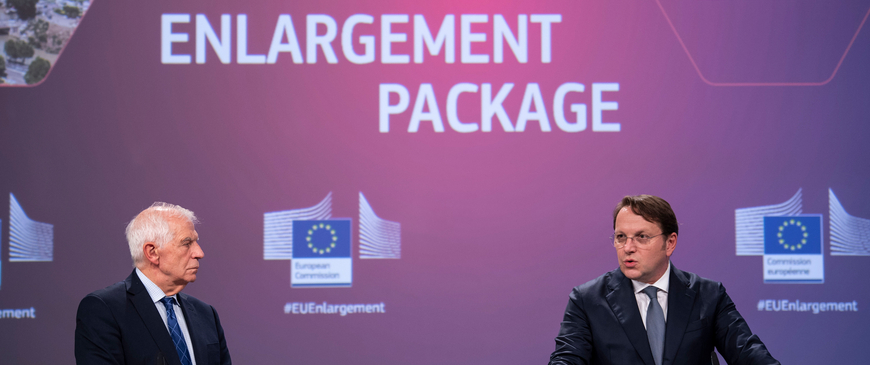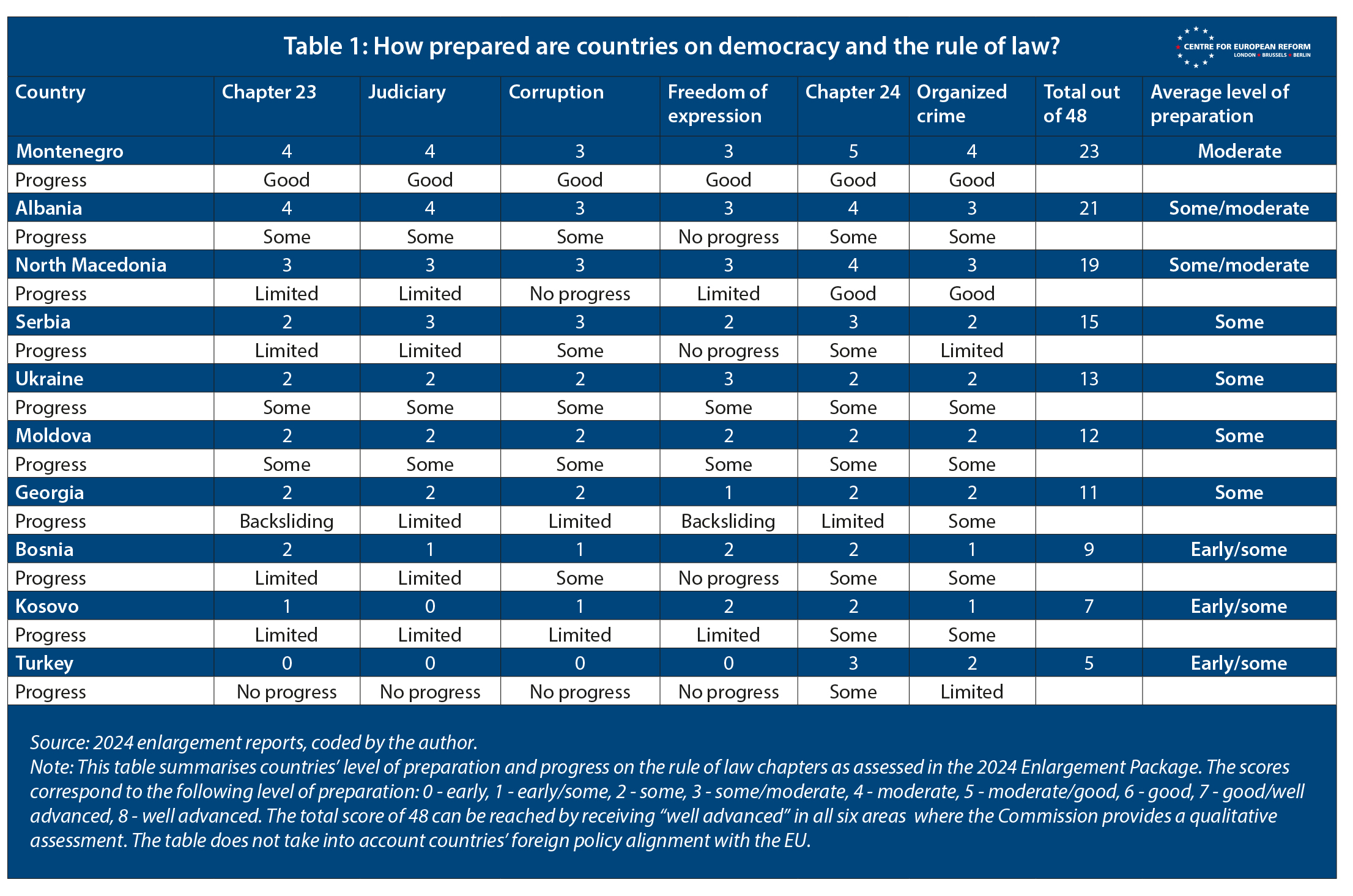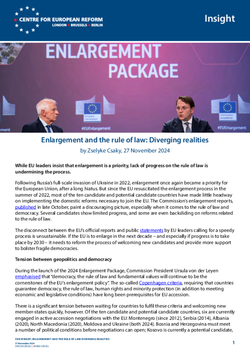
Enlargement and the rule of law: Diverging realities
While EU leaders insist that enlargement is a priority, lack of progress on the rule of law is undermining the process.
Following Russia’s full-scale invasion of Ukraine in 2022, enlargement once again became a priority for the European Union, after a long hiatus. But since the EU resuscitated the enlargement process in the summer of 2022, most of the ten candidate and potential candidate countries have made little headway on implementing the domestic reforms necessary to join the EU. The Commission’s enlargement reports, published in late October, paint a discouraging picture, especially when it comes to the rule of law and democracy. Several candidates show limited progress, and some are even backsliding on reforms related to the rule of law.
The disconnect between the EU’s official reports and public statements by EU leaders calling for a speedy process is unsustainable. If the EU is to enlarge in the next decade – and especially if progress is to take place by 2030 – it needs to reform the process of welcoming new candidates and provide more support to bolster fragile democracies.
The disconnect between the EU’s official reports and public statements by EU leaders calling for a speedy process is unsustainable.
Tension between geopolitics and democracy
During the launch of the 2024 Enlargement Package, Commission President Ursula von der Leyen emphasised that “democracy, the rule of law and fundamental values will continue to be the cornerstones of the EU's enlargement policy”. The so-called Copenhagen criteria, requiring that countries guarantee democracy, the rule of law, human rights and minority protection (in addition to meeting economic and legislative conditions) have long been prerequisites for EU accession.
There is a significant tension between waiting for countries to fulfil these criteria and welcoming new member-states quickly, however. Of the ten candidate and potential candidate countries, six are currently engaged in active accession negotiations with the EU: Montenegro (since 2012), Serbia (2014), Albania (2020), North Macedonia (2020), Moldova and Ukraine (both 2024). Bosnia and Herzegovina must meet a number of political conditions before negotiations can open; Kosovo is currently a potential candidate, but cannot advance while five member-states refuse to recognise its independence; the start of talks with Georgia is on hold because of concerns over democracy and the rule of law; and negotiations with Turkey have been frozen since 2018. Of the six countries actively negotiating, however, none are well prepared in relation to the rule of law and democracy. All ten have been slow to make necessary reforms in several areas. And the structure of the accession process has remained largely unchanged, even as the imperative to welcome new members as fast as possible has grown.
Of the six candidate countries actively negotiating, none is well prepared in relation to the rule of law and democracy.
Where do countries stand on the rule of law and democracy?
The accession process requires candidates to show that they have aligned their legislation with the EU acquis communautaire, the body of EU legislation and European Court of Justice rulings that bind member-states. The acquis is organised into 35 chapters. Chapters 23 and 24, together referred to as the ‘rule of law chapters’, cover reforms related to the judiciary, corruption, organised crime and fundamental rights. These topics, together with three additional chapters on public procurement and financial control, have been frontloaded in accession negotiations since 2020. This ‘fundamentals first’ approach requires countries to open these chapters first and close them last – but only after a solid track record of implementation. The change is supposed to prevent compliance only ‘on paper’ and ensure that there is no subsequent backsliding after countries join the EU.
But the 2024 enlargement reports show very slow movement on the rule of law in the Western Balkans. In fact, the EU’s political engagement with the region has lacked an insistence on democratic values and demonstrated a preference for other foreign policy priorities for quite some time – which has prompted some analysts to dub the process ‘enlargement theatre’. Demonstrating the clear link between enlargement and geopolitical considerations, von der Leyen gave a speech in Belgrade in late October, praising Serbian President Aleksandar Vučić for his country’s “humanitarian assistance and financial support” to Ukraine. To the surprise of many, she also commended Vučić’s commitment to reforms, “in particular on the rule of law and democracy”.
In reality, Serbia has made very little progress on the rule of law this year and is the least prepared country in the Western Balkans on Chapters 23 and 24 – apart from Bosnia and Herzegovina and Kosovo, which have yet to open membership negotiations (see Table 1). Since Vučić came into power in 2014, Serbia has experienced significant democratic deterioration and, as the Commission’s enlargement report highlighted, major problems have persisted in 2024. These included pressure on the judiciary, high-level corruption and smear campaigns and attacks – including by government officials – against civil society and independent media.

EU frontrunner Montenegro, unlike Serbia, has made 'good' progress on each of the six areas in the enlargement reports and was the first country to meet the so-called interim benchmarks in July. This means that Montenegro has adopted the necessary laws in Chapters 23 and 24 on the judiciary, corruption and organised crime and can now proceed to the final stage of accession negotiations. But this last stage requires that countries show a solid track record of implementation – a lengthy undertaking. At the same time, the 2024 enlargement report continued to highlight inter-ethnic polarisation, discrimination and hate crimes against vulnerable groups, and pressure on independent reporting and the public broadcaster as key issues. The Commission’s 2024 Rule of Law Reports, which for the first time covered Montenegro, Albania, Serbia and North Macedonia, also noted “serious challenges” in relation to the efficiency of the justice system (such as the length of administrative proceedings) and a “perception of impunity” regarding corruption.
Albania saw some progress on the rule of law in 2024, and the Council opened the five chapters on fundamentals in October. But the country is at best moderately prepared according to its enlargement report, with corruption remaining a “serious concern”, civil society organisations operating in a challenging environment and journalists facing intimidation. The 2024 Rule of Law Reports reiterated these problems, noting concerns about political interference in the judicial system and deep political polarisation, which has hindered the work of the parliament.
Progress was limited in North Macedonia, a country that has seen its accession talks stalled by Greece and Bulgaria. Greece claims the country’s new government has broken the historic 2018 deal that unlocked EU accession, which at the time renamed it from Macedonia to North Macedonia. And Bulgaria insists that Macedonia’s language and identity have Bulgarian origins that should be referenced in the country’s constitution. Irrespective of the delay caused by these disputes, North Macedonia has only made patchy progress on the rule of law. According to the 2024 Rule of Law Report, “the level of perceived judicial independence is very low” in the country; while the enlargement report noted that recent legal changes have weakened the anti-corruption framework; the overall situation in prisons is dire; and violence against journalists remains a problem.
Unlike the Western Balkans, the EU’s two new candidate countries, Ukraine and Moldova, saw considerable momentum this year. Ukraine’s accession is treated as a priority by both its national government and the EU. But aligning Ukraine’s institutional framework with the EU and improving its laws, such closing loopholes in tackling corruption, while the country is at war and under martial law is challenging. According to the Commission’s enlargement report, Ukraine has set up the institutional structures for accession and has made progress on all six areas in the rule of law chapters. Despite the war, Ukraine’s parliament continues to function with the government having little recourse to urgent procedures, which would reduce the time available to assess new laws and diminish the role of oversight in parliamentary proceedings. It has adopted key legislation in several areas, including on the protection of national minorities (a demand from Hungary, which has threatened to block Ukraine’s accession). But with the level of preparation assessed as just past the early stage in all areas except for freedom of expression, Kyiv has a long way to go to build a solid track record of implementation.
Moldova is at the same stage as Ukraine when it comes to progress on the rule of law. The enlargement report noted that Chisinau continued to implement policies to speed up EU integration, including adopting strategies on protecting human rights and tackling human trafficking and, like Ukraine, making progress on vetting judges and prosecutors. At the same time, issues such as a lack of trust in the reforms, political pressure in the media sector and intimidation of journalists continued. The reforms are also taking place against a background of enduring oligarchic influence and Russian attempts at destabilisation, including efforts to meddle in Moldova’s elections. The outcome of the October referendum on enshrining EU accession in the constitution, which passed by a very small margin, demonstrated the difficult task ahead for Chisinau.
How to bridge the gap
Altogether, the enlargement reports paint a discouraging picture of the state of the rule of law and democracy in most candidate countries, with even the best performers lagging behind on the necessary reforms. But the enlargement process is now the main vehicle for the EU to reach its foreign policy goals in the Western Balkans and, increasingly, also in Eastern Europe – which makes progress on accession even more important.
Four years ago, the EU frontloaded the rule of law and democracy in the enlargement process. But this shift has yet to make a meaningful difference to candidate countries’ performance. This is partly because, in practice, the EU has focused on providing economic incentives while failing to insist on tangible progress on democratic values – instead of the two going hand in hand. And partly it is because the accession criteria remain too formalistic and focused on institutional reform – a much-criticised aspect of the previous two rounds of enlargement – while leaving the people behind.
European politicians and think-tanks alike, including French President Emmanuel Macron and a Franco-German working group, have argued that the EU needs to reform if it is to enlarge. A significant part of that reform would focus on the EU itself and its ability to integrate new members without making its institutions and decision-making processes more unwieldy. Reform ideas focusing on candidate countries, in addition, argue for a more gradual approach to membership, whether in the shape of staged accession, concentric circles or some other format. Implementing these ideas would offer tangible rewards to those in waiting, allowing them to benefit gradually from the advantages offered by membership.
But any reform needs to reinforce the centrality of the rule of law and democracy to the EU, and put citizens at its centre. During the accession process, the EU could contribute more to building democratic resilience by channelling funding to civil society and not just to increasing state capacity. The EU could additionally make the enlargement process more participatory, providing support for bottom-up action such as citizen assemblies and incorporating criteria on firming up local democracy. Most importantly, as the SHAPEDEM-EU project recommended, it could redirect funding away from governments and towards civic actors in the event of democratic backsliding. Such a move would clarify the stakes for candidate countries’ governments without punishing their citizens.
Any reform needs to reinforce the centrality of the rule of law and democracy to the EU, and put citizens at its centre.
A lack of progress on the rule of law and democracy is not the only issue hindering enlargement. But if the EU injected renewed energy and more consistency into the process, it could provide meaningful benefits to the people on the ground. Moreover, it could also plant the seeds for well-functioning, sustainable democracies to grow in the long term.
Zselyke Csaky is a senior research fellow at the Centre for European Reform.


Add new comment